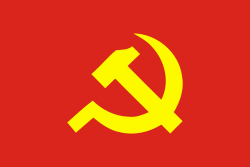General Secretary of the Communist Party of Vietnam
| General Secretary of the Central Committee of the Communist Party of Vietnam | |
|---|---|
|
Flag of the Communist Party of Vietnam | |
| Style | Comrade |
| Type | Party leader |
| Status | 1st in Politburo and Secretariat |
| Member of |
Central Committee Political Bureau Central Military Commission Secretariat |
| Appointer | Central Committee |
| Term length |
Five years renewable once |
| Precursor | First Secretary |
| Inaugural holder | Trần Phú |
| Formation | 27 October 1930 |
 |
| This article is part of a series on the politics and government of Vietnam |
|
Ideology |
|
|
|
Legislative |
|
|
Military
|
|
The General Secretary of the Central Committee of the Communist Party of Vietnam (Vietnamese: Tổng Bí thư Ban Chấp hành Trung ương Đảng Cộng sản Việt Nam), known as First Secretary (Vietnamese: Bí thư Thứ nhất) from 1951 to 1976, is the highest office within the Communist Party of Vietnam. The General Secretaryship was the second-highest office within the party when Hồ Chí Minh was Chairman, a post which existed from 1951 to 1969. The general secretary is also the Secretary of the Central Military Commission, the leading Party organ on military affairs.[1] For a period in its history, the position of general secretary has been synonymous with leader of Vietnam. The current general secretary is Nguyễn Phú Trọng, and he is ranked first in the Political Bureau.
Trần Phú, one of the founding members of the Indochinese Communist Party, was the party's first general secretary. A year after being elected, he was sentenced to prison by the French authorities because of anti-French activities. He died in prison the same year.[2] Trần's de facto successor was Lê Hồng Phong who led the party through the office of General Secretary of the Overseas Executive Committee (OEC). The OEC general secretary led the party because the Central Committee had been all but annihilated.[3] Hà Huy Tập, the third general secretary, was removed from his post in March 1938, and was arrested by the authorities in May.[4] Nguyễn Văn Cừ, the fourth general secretary, was arrested by the authorities in June 1940, and executed by shooting on 25 May 1941. He was succeeded by Trường Chinh in May 1941.[5] An article in Nhân Dân on 25 March 1951 described Trường's role as the "builder and commander" of the revolution, while Hô Chí Minh was referred to as "the soul of the Vietnamese revolution and the VIetnamese resistance".[6] Trường was demoted as First Secretary in 1956 because of his role in the "bloody Land Reform campaign".[7] Hô took over the office of First Secretary, but quickly appointed Lê Duẩn acting First Secretary.[8] Lê was elected general secretary in 1960, and was the second only to Hô until the latter's death on 2 September 1969.[9]
From 2 September 1969 until his death on 10 July 1986, Lê was the undisputed leader of Vietnam.[10] He died two months before the next National Party Congress, and was succeeded by Trường, the former general secretary who had served as the second-most powerful politician in Vietnam since Hô's death. Trường was demoted from his post at the 6th National Party Congress, and was succeeded by Nguyễn Văn Linh.[11] The Western press called Linh "Vietnam's Gorbachev" because of his reformist policies.[12] Linh resigned because of bad health in 1991, and Đỗ Mười was appointed to the general secretaryship by the 7th National Congress.[13] Mười ruled until 1997, when he was ousted from power by the reformist-wing of the party.[14] Lê Khả Phiêu was Mười's successor, and he was elected as a compromise candidate.[15] Phiêu was ousted in 2001, before the 10th National Party Congress, when the Central Committee overturned a decision of the Politburo; a majority in the Central Committee voted to remove Phiêu as general secretary.[16] Nông Đức Mạnh succeeded Phiêu, and Manh came to be considered a moderniser. Manh was also the first general secretary with a university degree.[17] Manh retired in 2011, and Nguyễn Phú Trọng succeeded him, and he now is considered the most powerful political figure in Vietnam.[18]
The General Secretary presides over the work of the Central Committee, the Political Bureau, the Secretariat, and chairs meetings with key leaders (Working Regulation of the Central Committee, 2011).
Officeholders
| № [note 1] |
Name (Birth–Death) |
Took office | Left office | Rank [note 2] |
Central Committee | Portrait |
|---|---|---|---|---|---|---|
| 1 | Trần Phú (1904–1931) |
27 October 1930 | 6 September 1931 | 1 | Provisional Central Committee (1930–35) |
 |
| 2 | Lê Hồng Phong (1902–1942) |
27 October 1931 | 26 July 1936 | 1 | 1st Central Committee (1935–51) | 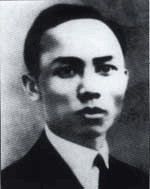 |
| 3 | Hà Huy Tập (1906–1941) |
26 July 1936 | 30 March 1938 | 1 | 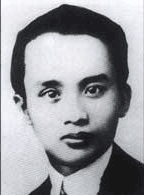 | |
| 4 | Nguyễn Văn Cừ (1912–1941) |
30 March 1938 | 9 November 1940 | 1 | 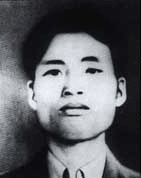 | |
| 5 | Trường Chinh (1907–1988) |
May 1941 | 24 September 1956 | 1 [note 3] |
1st Central Committee (1935–51) | 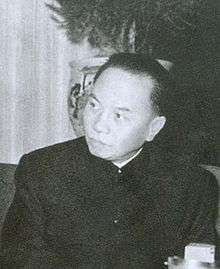 |
| 2 | 2nd Central Committee (1951–60) | |||||
| 6 | Hồ Chí Minh (1890–1969) |
24 September 1956 | 10 September 1960 | 1 | 2nd Central Committee (1951–60) |  |
| 3rd Central Committee (1960–76) | ||||||
| 7 | Lê Duẩn (1907–1986) |
10 September 1960 | 10 July 1986 | 2 [note 4] |
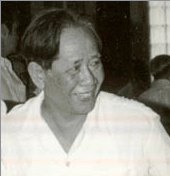 | |
| 1 | 4th Central Committee (1976–82) | |||||
| 5th Central Committee (1982–86) | ||||||
| 5 | Trường Chinh (1907–1988) |
14 July 1986 | 18 December 1986 | 1 | 5th Central Committee (1982–86) |  |
| 8 | Nguyễn Văn Linh (1915–1998) |
18 December 1986 | 28 June 1991 | 1 | 6th Central Committee (1986–91) |  |
| 9 | Đỗ Mười (1917–) |
28 June 1991 | 26 December 1997 | 1 | 7th Central Committee (1991–96) | 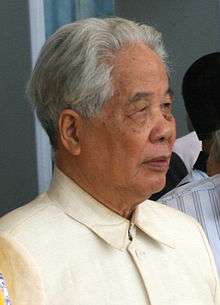 |
| 8th Central Committee (1996–2001) | ||||||
| 10 | Lê Khả Phiêu (1931–) |
26 December 1997 | 22 April 2001 | 1 | | |
| 11 | Nông Đức Mạnh (1940–) |
22 April 2001 | 19 January 2011 | 1 | 9th Central Committee (2001–06) | 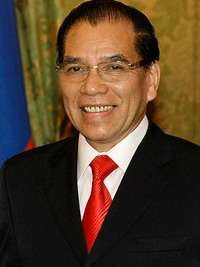 |
| 10th Central Committee (2006–11) | ||||||
| 12 | Nguyễn Phú Trọng (1944–) |
19 January 2011 | Incumbent | 1 | 11th Central Committee (2011–16) | 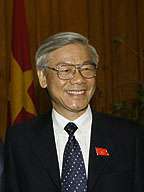 |
| 12th Central Committee (2016–21) |
Notes
- ↑ These numbers are not official.
- ↑ The Central Committee when it convenes for its first session after being elected by a National Party Congress elects the Politburo.[19] According to David Koh, in interviews with several high-standing Vietnamese officials, the Politburo ranking is based upon the number of approval votes given by the Central Committee. Lê Hồng Anh, the Minister of Public Security, was ranked 2nd in the 10th Politburo because he received the second-highest number of approval votes. Another example being Tô Huy Rứa of the 10th Politburo, he was ranked at the bottom because he received the lowest number of approval votes. This system was implemented at the 1st plenum of the 10th Central Committee.[20] Before the 10th Party Congress Politburo rankings functioned as the official order of precedence, but it doesn't any longer (however, there are some who disagree with this view).[19]
- ↑ He was ranked #1 until the 1945 August Revolution led by Hồ Chí Minh.
- ↑ He was ranked second until the death of Hồ Chí Minh, the CPV Chairman, on 2 September 1969.[9]
References
- ↑ Porter 1993, pp. 83–84.
- ↑ Dodd, Lewis & Emmons 2003, p. 557.
- ↑ Brocheux 2007, p. 60.
- ↑ Sophie Quinn-Judge 2003, p. 225.
- ↑ Currey 2005, p. 61.
- ↑ Sophie Quinn-Judge 2003, pp. 1–2.
- ↑ Thai 1985, pp. 27–29.
- ↑ Ooi 2004, p. 777.
- 1 2 Brocheux 2007, p. 174.
- ↑ Woods 2002, p. 74.
- ↑ Corfield 2008, pp. 111–112.
- ↑ M.G. Mason & M. Mason 1997, p. 313.
- ↑ "March of the poor and friendless (Vietnamese Communist Party holds its 7th Congress)". The Economist. June 29, 1991.
- ↑ Largo 2002, pp. 10–13.
- ↑ Abuza, Zachary (16 November 2001). "The Lessons of Le Kha Phieu: Changing Rules in Vietnamese politics". Vietnamese Professionals of America. The Catholic University of America. p. 1.
- ↑ Abuza, Zachary (16 November 2001). "The Lessons of Le Kha Phieu: Changing Rules in Vietnamese politics". Vietnamese Professionals of America. The Catholic University of America. p. 12.
- ↑ "Modernising leader for Vietnam". BBC World News. BBC Online. 22 April 2001. Retrieved 27 April 2012.
- ↑ "Party Congress announces CPVCC Politburo members". Government of the Socialist Republic of Vietnam. 19 January 2011. Retrieved 23 April 2012.
- 1 2 Van & Cooper 1983, p. 69.
- ↑ Koh 2008, p. 666.
Bibliography
- Brocheux, Pierre (2007). Ho Chi Minh: a Biography. Cambridge University Press. ISBN 9780521850629.
- Corfield, Justin (2008). The History of Vietnam. ABC-CLIO. ISBN 9780313341946.
- Currey, Cecil (2005). Victory At Any Cost: The Genius of Vietnam's Gen. Vo Nguyen Giap. Potomac Books. ISBN 9781612340104.* Dodd, Jan; Lewis, Mark; Emmons, Ron (2003). Rough Guide to Vietnam. Rough Guides. ISBN 9781843530954.
- Koh, David (July–August 2008). "Leadership Changes at the 10th Congress of the Vietnamese Communist Party". Asian Survey. University of California Press. 48 (4): 650–672. doi:10.1525/as.2008.48.4.650.
- Largo, V. (2002). Vietnam: Current Issues and Historical Background. Nova Publishers. ISBN 9781590333686.
- Mason, Michael G.; Mason, Mike (1997). Development and Disorder: A History of the Third World Since 1945. University Press of New England. ISBN 9780874518290.
- Ooi, Keat Gin (2004). Southeast Asia: a Historical Encyclopedia, from Angkor Wat to East Timor. 2. ABC-CLIO. ISBN 9781576077702.
- Porter, Gareth (1993). Vietnam: The Politics of Bureaucratic Socialism. Cornell University Press. ISBN 9780801421686.
- Quinn-Judge, Sophie (2002). Ho Chi Minh: The Missing Years, 1919–1941. University of California Press. ISBN 9780520235335.
- Van, Canh Nguyen; Cooper, Earle (1983). Vietnam under Communism, 1975–1982. Hoover Press. ISBN 9780817978518.
- Woods, L. Shelton (2002). Vietnam: a Global Studies Handbook. ABC-CLIO. ISBN 9781576074169.
- Thai, Quang Trung (2002). Collective Leadership and Factionalism: an Essay on Ho Chi Minh's Legacy. Institute of Southeast Asian Studies. ISBN 9789971988012.
